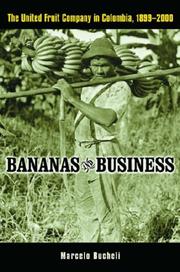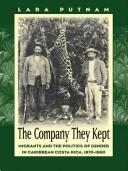| Listing 1 - 4 of 4 |
Sort by
|

ISBN: 1479838225 9781479838226 0814799345 9780814799345 Year: 2005 Publisher: New York, NY
Abstract | Keywords | Export | Availability | Bookmark
 Loading...
Loading...Choose an application
- Reference Manager
- EndNote
- RefWorks (Direct export to RefWorks)
For well over a century, the United Fruit Company (UFCO) has been the most vilified multinational corporation operating in Latin America. Criticism of the UFCO has been widespread, ranging from politicians to consumer activists, and from labor leaders to historians, all portraying it as an overwhelmingly powerful corporation that shaped and often exploited its host countries. In this first history of the UFCO in Colombia, Marcelo Bucheli argues that the UFCO's image as an all-powerful force in determining national politics needs to be reconsidered. Using a previously unexplored source—the internal archives of Colombia's UFCO operation—Bucheli reveals that before 1930, the UFCO worked alongside a business-friendly government that granted it generous concessions and repressed labor unionism. After 1930, however, the country experienced dramatic transformations including growing nationalism, a stronger labor movement, and increasing demands by local elites for higher stakes in the banana export business. In response to these circumstances, the company abandoned production, selling its plantations (and labor conflicts) to local growers, while transforming itself into a marketing company. The shift was endorsed by the company's shareholders and financial analysts, who preferred lower profits with lower risks, and came at a time in which the demand for bananas was decreasing in America. Importantly, Bucheli shows that the effect of foreign direct investment was not unidirectional. Instead, the agency of local actors affected corporate strategy, just as the UFCO also transformed local politics and society.
Banana trade --- Banana industry --- Fruit trade --- History --- United Fruit Company --- I︠U︡naĭted frut kompani --- United Fruit (Firm) --- UFCO (United Fruit Company) --- Cuyamel Fruit Company --- Boston Fruit Company --- United Brands Company --- History. --- BANANE --- COMMERCIO --- COLOMBIA. --- Banane --- Commerce --- Histoire

ISBN: 9798890875365 0807862231 9780807862230 0807827320 9780807827321 0807827320 0807854069 9780807854068 Year: 2002 Publisher: Chapel Hill University of North Carolina Press
Abstract | Keywords | Export | Availability | Bookmark
 Loading...
Loading...Choose an application
- Reference Manager
- EndNote
- RefWorks (Direct export to RefWorks)
In the 19th century, migrants from the USA, across the Caribbean and beyond poured into Caribbean Central America, drawn by the established banana plantations and economic booms, creating a very mixed population. This work explores the effects of this change on gender, kinship and community.
Migrant agricultural laborers --- Women --- Black people --- Sex role --- Power (Social sciences) --- Social conditions. --- History. --- United Fruit Company --- Employees --- Puerto Limón (Costa Rica) --- Economic conditions. --- Blacks --- Puerto Limon (Costa Rica)
Book
ISBN: 0826359434 0826359426 Year: 2018 Publisher: Albuquerque : University of New Mexico Press,
Abstract | Keywords | Export | Availability | Bookmark
 Loading...
Loading...Choose an application
- Reference Manager
- EndNote
- RefWorks (Direct export to RefWorks)
Imperialism --- Corporations --- Banana trade --- Banana industry --- Fruit trade --- Business corporations --- C corporations --- Corporations, Business --- Corporations, Public --- Limited companies --- Publicly held corporations --- Publicly traded corporations --- Public limited companies --- Stock corporations --- Subchapter C corporations --- Business enterprises --- Corporate power --- Disincorporation --- Stocks --- Trusts, Industrial --- Colonialism --- Empires --- Expansion (United States politics) --- Neocolonialism --- Political science --- Anti-imperialist movements --- Caesarism --- Chauvinism and jingoism --- Militarism --- Economic aspects. --- Political aspects --- United Fruit Company. --- I︠U︡naĭted frut kompani --- United Fruit (Firm) --- UFCO (United Fruit Company) --- Cuyamel Fruit Company --- Boston Fruit Company --- United Brands Company --- United States --- Foreign relations
Book
ISBN: 9780801449154 0801449154 1322504849 0801462711 0801478995 080146272X 9780801462726 9780801462719 9780801478994 Year: 2011 Publisher: Ithaca, NY
Abstract | Keywords | Export | Availability | Bookmark
 Loading...
Loading...Choose an application
- Reference Manager
- EndNote
- RefWorks (Direct export to RefWorks)
The link between private corporations and U.S. world power has a much longer history than most people realize. Transnational firms such as the United Fruit Company represent an earlier stage of the economic and cultural globalization now taking place throughout the world. Drawing on a wide range of archival sources in the United States, Great Britain, Costa Rica, and Guatemala, Colby combines "top-down" and "bottom-up" approaches to provide new insight into the role of transnational capital, labor migration, and racial nationalism in shaping U.S. expansion into Central America and the greater Caribbean. The Business of Empire places corporate power and local context at the heart of U.S. imperial history. In the early twentieth century, U.S. influence in Central America came primarily in the form of private enterprise, above all United Fruit. Founded amid the U.S. leap into overseas empire, the company initially depended upon British West Indian laborers. When its black workforce resisted white American authority, the firm adopted a strategy of labor division by recruiting Hispanic migrants. This labor system drew the company into increased conflict with its host nations, as Central American nationalists denounced not only U.S. military interventions in the region but also American employment of black immigrants. By the 1930's, just as Washington renounced military intervention in Latin America, United Fruit pursued its own Good Neighbor Policy, which brought a reduction in its corporate colonial power and a ban on the hiring of black immigrants. The end of the company's system of labor division in turn pointed the way to the transformation of United Fruit as well as the broader U.S. empire.
Industrial relations --- Relations industrielles --- History --- Histoire --- United Fruit Company --- History. --- Central America --- United States --- Amérique centrale --- Etats-Unis --- Foreign relations --- Commerce --- Race relations --- Relations extérieures --- Relations raciales --- BUSINESS & ECONOMICS --- Regions & Countries - Americas --- History & Archaeology --- Latin America --- Amérique centrale --- Relations extérieures --- Capital and labor --- Employee-employer relations --- Employer-employee relations --- Labor and capital --- Labor-management relations --- Labor relations --- I︠U︡naĭted frut kompani --- United Fruit (Firm) --- UFCO (United Fruit Company) --- Mercado Común Centroamericano countries --- U.S.A. --- Jungtinės Amerikos valstybės --- Soedinennye Shtaty Si︠e︡vernoĭ Ameriki --- Soedinennye Shtaty Severnoĭ Ameriki --- Si︠e︡vero-Amerikanskīe Soedinennye Shtaty --- Severo-Amerikanskie Soedinennye Shtaty --- Zlucheni Derz︠h︡avy --- USA --- US --- Arhab --- Ar. ha-B. --- Artsot ha-Berit --- ولايات المتحدة الامريكية --- Wilāyāt al-Muttaḥidah al-Amirīkīyah --- ABSh --- Amerika Birlăshmish Shtatlary --- ABŞ --- Amerika Birlăşmi Ştatları --- Forente stater --- Spojené staty americké --- Severo-Amerikanskie Shtaty --- Sjedinjene Američke Države --- Zʹi︠e︡dnani Derz︠h︡avy Ameryky --- Amerikai Egyesült Államok --- Yhdysvallat --- Verenigde Staten --- Egyesült Államok --- Hiwsisayin Amerikayi Miatsʻeal Tērutʻiwnkʻ --- Estados Unidos de América --- United States of America --- Fareyniḳṭe Shṭaṭn --- Artzois Ha'bris --- Estados Unidos da América do Norte --- SShA --- Soedinennye Shtaty Ameriki --- VSA --- États-Unis d'Amérique --- Vereinigte Staaten von Amerika --- Stati Uniti d'America --- Estados Unidos --- EE.UU. --- Stany Zjednoczone --- ĒPA --- Amerika Qūrama Shtattary --- Amerika Qŭshma Shtatlari --- SAD --- Saharat ʻAmērikā --- Hēnomenai Politeiai Amerikēs --- ZSA --- Mei-kuo --- Meiguo --- Mei guo --- ZDA --- Združene države Amerike --- U.S. --- America (Republic) --- Amirika Carékat --- Verenigde State van Amerika --- VS --- ولايات المتحدة --- Wilāyāt al-Muttaḥidah --- ولايات المتّحدة الأمريكيّة --- Wilāyāt al-Muttaḥidah al-Amrīkīyah --- Estatos Unitos --- Estatos Unitos d'America --- Ètats-Unis d'Amèrica --- Estaos Xuníos d'América --- Estaos Xuníos --- Tetã peteĩ reko Amérikagua --- Istadus Unidus --- Amerika Birlăşmiş Ştatları --- Amerika ka Kelenyalen Jamanaw --- Bí-kok --- Amerika Qushma Shtattary --- AQSh --- Злучаныя Штаты Амерыкі --- Zluchanyi︠a︡ Shtaty Ameryki --- Yunaeted Stet blong Amerika --- Yunaeted Stet --- Vaeinigte Staatn --- Vaeinigte Staatn vo Amerika --- Stadoù-Unanet Amerika --- Sŭedineni amerikanski shtati --- САЩ --- SASht --- Съединените щати --- Sŭedinenite shtati --- Америка (Republic) --- Amerika (Republic) --- Estats Units d'Amèrica --- Америкӑри Пӗрлешӳллӗ Штатсем --- Amerikări Pĕrleshu̇llĕ Shtatsem --- Stati Uniti --- SUA (Stati Uniti d'America) --- Unol Daleithiau America --- Unol Daleithiau --- Amerikas Forenede Stater --- Vereinigte Staaten --- Wááshindoon Bikéyah Ałhidadiidzooígíí --- Zjadnośone staty Ameriki --- Ameerika Ühendriigid --- Ηνωμένες Πολιτείες της Αμερικής --- Hēnōmenes Politeies tēs Amerikēs --- Η.Π.Α. --- Ē.P.A. --- Usono --- Unuiĝintaj Ŝtatoj de Ameriko --- Американь Вейтьсэндявкс Штаттнэ --- Amerikanʹ Veĭtʹsėndi︠a︡vks Shtattnė --- Ameriketako Estatu Batuak --- Feriene Steaten --- Feriene Steaten fan Amearika --- FS --- Stâts Unîts di Americhe --- Stâts Unîts --- Stáit Aontaithe Mheiriceá --- Steatyn Unnaneysit America --- Steatyn Unnaneysit --- S.U.A. --- Na Stàitean Aonaichte --- NSA --- Mî-koet --- 미국 --- Miguk --- Amerikayi Miatsʻyal Nahangner --- Miatsʻyal Nahangner --- Employees --- Management --- Cuyamel Fruit Company --- Boston Fruit Company --- United Brands Company --- Американь Вейтьсэндявкс Штаттнэ --- Spojené obce severoamerické --- États-Unis --- É.-U. --- ÉU
| Listing 1 - 4 of 4 |
Sort by
|

 Search
Search Feedback
Feedback About UniCat
About UniCat  Help
Help News
News